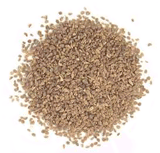
Celery Seed
Introduction
This fact sheet provides basic information about Celery Seed. Celery originated as a wild plant growing in salt marshes around the Mediterranean Sea. About 450 B.C., the Greeks used it to make a type of wine called selinites. It served as an award at early athletic games, much as laurel leaves or olive branches. By the Middle Ages, Europeans were cultivating celery. Since that time, the plant has been used widely both as a food and as a medicine.Common Names
Celery, celery seed, celery seed oilLatin Names
Apium graveolensWhat It Is Used For
- The seed is used as a diuretic and as a treatment for arthritis and rheumatism. The seed oil has produced sedative effects. Celery has been used in herbal medicine to treat arthritis, nervousness, hysteria and various other conditions. The juice lowered blood pressure in several patients. Two components reduced tumors in mice.
- Lowers Blood Pressure and Cholesterol
- Healthy Joints
- Antiseptic Properties
- Acts as A Diuretic
- Anxiety
- Aids Digestion
How It Is Used
Throughout much of history, celery and celery seed has been used primarily as a homeopathic and medicinal herbs. Not until relatively recent history has celery been used for culinary purposes. The flavor of celery is somewhat herbal and astringent, but it has a succulent, crisp texture. Because of its low-calorie count, celery is a favorite diet food.-
Nutritional Content of Celery
- Amino acids
- Boron
- Calcium
- Choline
- Essential fatty acids
- Folate
- Inositol
- Iron
- Magnesium
- Manganese
- Phosphorous
- Potassium
- Selenium
- Sulfur
- Zinc
- Vitamins A
- Vitamins B1
- Vitamins B2
- Vitamins B3
- Vitamins B5
- Vitamins B6
- Vitamins C
- Vitamins E
- Vitamins K
Celery contains the following chemical compounds and nutrients:
What the Science Says
- In man, the juice has been shown to have effectively lowered blood pressure in 14 of 16 hypertensive patients.
- Herbalists recommend celery for treatment of arthritis, nervousness and hysteria. Oriental medicine uses the seeds to treat headaches and as a diuretic, digestive aid and emmenagogue. Celery has also been prescribed as an antiflatulent, antilactogen and aphrodisiac.
Side Effects and Cautions
- There is no recent clinical evidence to guide dosage of celery. Carminative use of the seed typically involves 1 to 4 g doses.
- Menstrual Discomfort - celery may promote the onset of menstruation.
Sources
- Drugs.Com Web site. Accessed on February 6, 2009.
- From Wikipedia, the free encyclopedia. Accessed on February 6, 2009.






